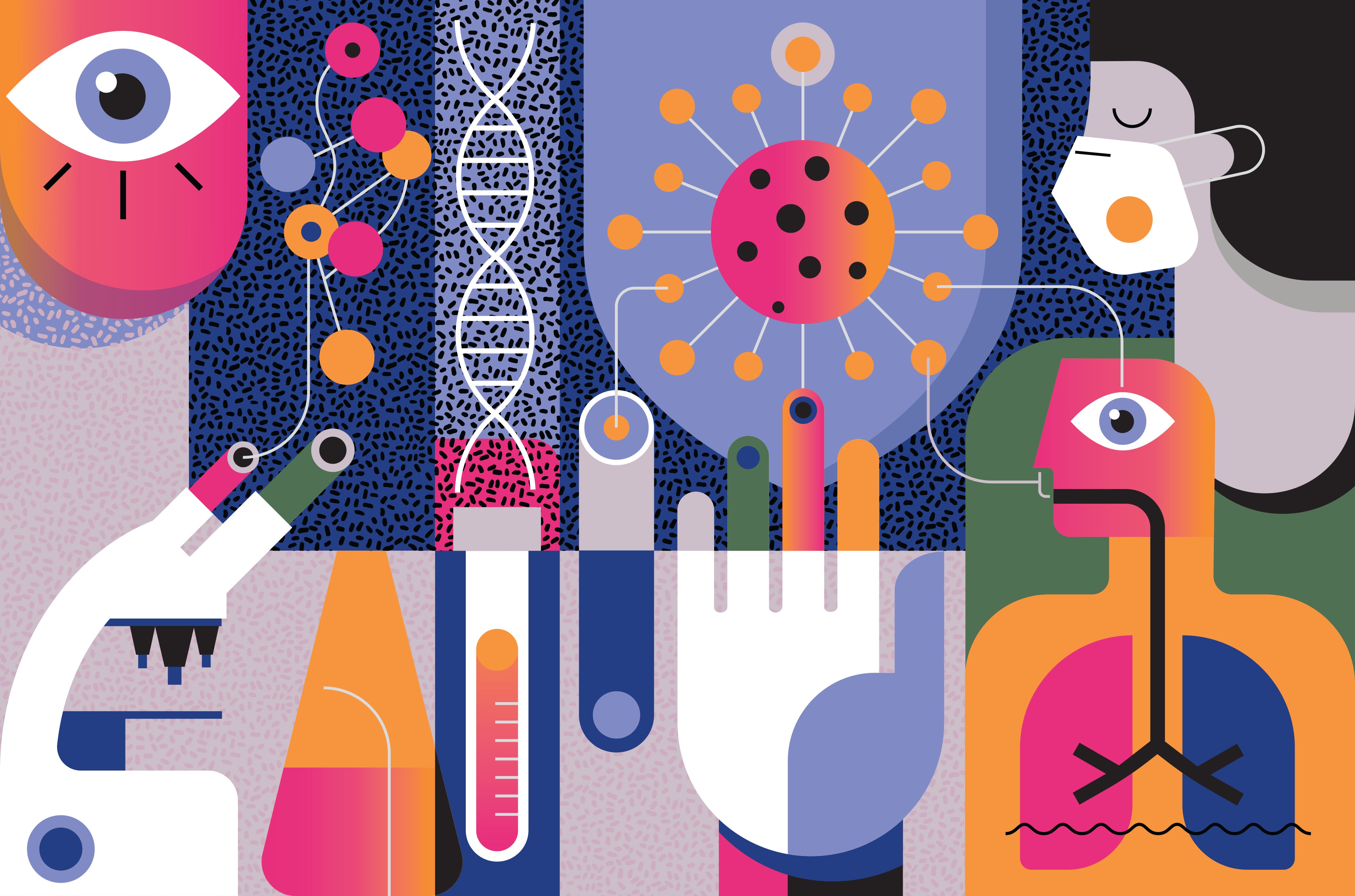The Independent's journalism is supported by our readers. When you purchase through links on our site, we may earn commission.
The value of a salon haircut and the power of touch: Life lessons we learnt in the pandemic
For all the horror of 2020, these are the lessons we must take with us into the new year, writes Joanna Whitehead


As we approach the close of one of the most turbulent years in living memory, it’s entirely possible that those of us who have survived it will only be able to digest its sheer enormity with the passage of time. Over 1.6 million people around the globe have died as a result of Covid-19, a devastating figure that continues to grow daily.
While there’s no doubt that 2020 has been a year of tragedy for many, it’s also been an opportunity for reflection and growth. Whether it’s the realisation that a relationship or job no longer works, or a newfound enthusiasm for gardening , we take a look at some of the things we’ve learnt over the past 12 months, from the fanciful to the philosophical.
A walk on the wild side
The arrival of spring coincided with a national lockdown in 2020. As travel plans halted and movement was limited, uncharacteristically clement weather and later heatwaves spread across the UK. While our world shrank, we began to explore the one on our doorstep, with city and country dwellers alike finding an increased sense of solace in the changing season.
We noticed more birdsong, with a third of Brits hearing birds in built-up areas for the first time. Our daily government-mandated constitutionals led us to discover new green spaces, even in the heart of the city. Long-running BBC series Gardener’s World witnessed some of its highest viewing figures in over a decade as people were able to spend more time in their gardens and find joy in nature. The mental health benefits of gardening were so celebrated in lockdown that garden centres were soon classed as essential shops by the time the restrictions began to lift.
Whether it was through the return of certain animals – such as the reclamation of a Welsh town by wild goats – or a steep (initial) drop in air pollution, 2020 was a good year for us to discover and appreciate the natural world.
Masks, but make it fashion
Who wears a face mask and when continues to be an ongoing bone of contention throughout the pandemic. Although mask-wearing is well established throughout Asia for a whole wealth of reasons, including consideration for others when the wearer is sick, a hard line of British and North American citizens argued that wearing a mask was an infringement of their personal freedom. There was also a gender divide when it came to face coverings, with some men seeing mask-wearing as emasculating. Thankfully, a large percentage of people complied with mask wearing regulations in a bid to fight the virus.
The fashion industry also stepped up to play their part. As well as funding research into a vaccine, Burberry repurposed its factories in Yorkshire to produce PPE. The British brand joined Chanel in producing reusable masks, a move with a profound environmental impact as recent figures revealed that more than 100 million disposable coverings are thrown away each week in the UK.
With the scientific community in agreement that a mask is one of the best ways to stop the spread of coronavirus, designers seized the opportunity to produce a garment that is not only functional, but fashionable. From silk to linen, floral to Burberry check, we’ve found that wearing a mask is not only a responsible way to keep ourselves and others safe, but another opportunity for sartorial peacocking. We wouldn’t have it any other way.
Cuddle curtains and the power of touch
One of the hardest things about the pandemic has been the physical distancing we have been required to adopt in a bid to minimise the spread of the virus. Physical touch, from a hug to a handshake, has all but disappeared with a real, neurological issue scientifically known as affection deprivation having a profound impact on health. Stress, depression, loneliness, anxiety are all linked to a lack of physical touch, conditions that have been disproportionately compounded since the start of the pandemic.
Physical touch releases oxytocin and serotonin (happy hormones), reduces cortisol (the stress hormone) and helps lower our heart rate, so it’s no wonder that hugs are one of the things we miss most about seeing other people. Staff at a care home in Italy even installed “cuddle curtains” to enable residents to have some physical contact with loved ones in November, albeit through a plastic sheet, evidencing the importance of touch on a person’s wellbeing. And while the rollout of the Pfizer-BioNTech vaccine is a landmark moment in the pandemic’s trajectory, many people will have to hold out until before it’s safe to share a hug with a loved one, following the government’s U-turn on the allowing households to form a Christmas “bubble”.
Bad hair days
With the country operating in a form of lockdown for more than nine months, hair and beauty salons were forced to close between March and July meaning personal grooming quickly fell by the wayside.
Frustrated with wayward locks and emerging roots, many took matters into their own hands, with partners and housemates taking on styling duties with vigour despite a demonstrable lack of experience. Results ranged from mixed to catastrophic, with friends and colleagues appearing on Zoom calls with buzz cuts, celebrities such as Katy Perry and Lily Allen showing off their grey hairs and natural roots, and even Scotland’s first minister Nicola Sturgeon revealing she’d cut her own hair during lockdown.
The nation breathed a collective sigh of relief when hair salons were given permission to reopen on 4 July. For many, the damage had been done, however, with some professional hairdressers describing clients’ home hair-dos as “horrific”.
Personal grooming didn’t just end with hair, however. Google searches for DIY beauty treatments quadrupled between March and April, with more than a million related queries. Social media feeds were full of people sharing the good, the bad and downright disastrous efforts to primp and preen, prompting the National Health and Beauty Federation (NHBF) to issue a warning against home treatments and avoid the risk of potentially harming oneself. “These people [professionals] are highly trained, skilled and talented so leave it to them,” they said.
With salons once again forced to close in tier 4 areas, the return to at-home beauty treatments is imminent. Handle with care.
Small mercies
A telephone call with a friend. A strong cup of coffee on a cold winter morning. A good book. A flower in full bloom. With travel, pubs, restaurants, hugs from family and friends, cinemas and theatres inaccessible to many of us this year, we’ve been forced to redefine our idea of fun and discover new ways of getting our kicks. From taking up knitting to learning to how to make sourdough starters and joining in with family Zoom quizzes, what qualifies as “fun” has shifted dramatically.
For many, this has been a time for reflection and a reconsideration of the things that matter, such as a greater appreciation of our health and the love of family and friends. At a time when hundreds of thousands of people are mourning loved ones, homes, jobs and freedoms, gratitude for life’s simplest things has never seemed more important.
Working from home realness
“Our grandchildren are not going to believe that we once went to offices just to put on headphones to drown out our colleagues and wrap ourselves up in giant shawls because it was freezing,” tweeted writer and editor Jenee Desmond-Harris in September, with more than 50,000 people liking the post.
The benefits of home working were put to the test during the pandemic, with many workers using the additional hours in their day that were previously spent commuting to cook, exercise and spend time with family. One study found that over 80 per cent of those surveyed believed greater work flexibility would help them take better care of their mental health, with 66 per cent stating they would prefer to work remotely full time after the pandemic is over.
Employer’s erstwhile fears that staff working from home would equate to a fall in productivity were disproved, demonstrating that it doesn’t matter where the work is done as long as it gets done. Firms such as Google, Twitter and Fujitsu announced plans to make remote working an option beyond the pandemic, while a TalkTalk survey from September revealed that over half of employees polled (58 per cent) reported greater productivity while working from home.
Not everyone benefited, however. As in other areas of domestic life, the additional burden of childcare was disproportionately placed on the shoulders of mothers, with many struggling to juggle care for dependents with paid work.
Friendship audit
With the pandemic putting the kibosh on most of our social lives, 2020 has really been the year when we’ve sorted the wheat from the proverbial chaff on the friendship front. Whether it’s been a personal crisis, health problems, or the death of a loved one, the past nine months have revealed who we can really rely on when the chips are down. From people organising Zoom hen dos and birthdays with friends to sending care packages in the post, true friendships meant more than ever, and though many of us missed the special relationship of the casual acquaintance, we also enjoyed the welcome relief from a once inundated WhatsApp.
Lean in to leisure wear
The fashion world saw a boom in loungewear and activewear during lockdowns, as people opted for comfort over style and launched into at-home workouts. Even Anna Wintour was forced to embrace the sartorial ease of tracksuit bottoms. According to retail analytics company Edited, sales of activewear in the UK were up 97 per cent in the first week of April alone. Elsewhere, legging sales were up 61 per cent and Marks & Spencer reported a 50 per cent increase in tie-waist trousers this autumn compared with last.
When there’s no one to impress, comfort becomes king, and shoppers sought cosiness and consolation over restrictive garms. Bras were also discarded with a sigh of relief after a shift to working from home meant a break from uncomfortable underwear. While this may change if and when we return to normality, let’s enjoy our comfortable clothing while it lasts.
Join our commenting forum
Join thought-provoking conversations, follow other Independent readers and see their replies
Comments



Bookmark popover
Removed from bookmarks